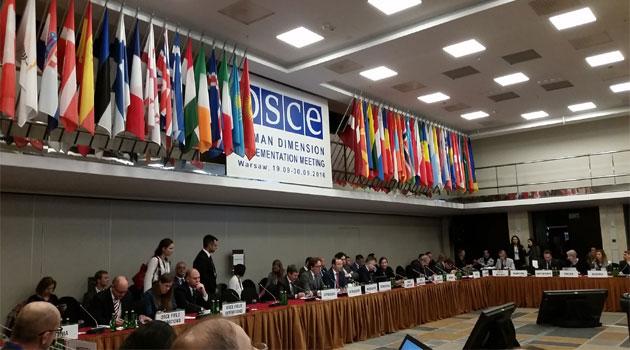OSCE meeting on human rights includes session on Roma and Sinti

The Office for Democratic Institutions and Human Rights has been holding its
traditional Human Dimension Implementation Meeting (HDIM) of the Organization
for Security and Cooperation in Europe (OSCE) will focus on Roma and Sinti today.
VIDEO
OSCE participating States should step up their efforts to ensure the full
participation of Roma and Sinti in their societies, and particularly their
inclusion in political life, said participants in the working session focusing
on Roma and Sinti issues held on 28 September 2016 as part of the annual Human
Dimension Implementation Meeting (HDIM) in Warsaw.
The event brought together representatives of civil society and state
authorities from across the OSCE region to discuss the access of Roma and Sinti
to elected and appointed positions within state institutions, progress in the
implementation of the 2003 Action Plan on Improving the Situation of Roma and
Sinti within the OSCE Area, and related obstacles.
In particular, participants stressed the impact of “anti-Gypsyism” on policy-making
processes directly affecting representatives of these groups.
“Anti-Gypsyism continues to be largely unpunished and deeply ingrained in the
societies of a substantial number of OSCE participating States,” Valeriu Nicolae,
Special Representative of the Secretary General of the Council of Europe for
Roma Issues, said in his opening speech. “As long as racism towards Roma remains
acceptable and goes unpunished, our participation in our societies will always
be limited.”
“If I want to change something, it cannot be changed from below, because
decisions are made at the highest level and then delegated to municipalities,”
Lucie Fuková, a Roma activist and member of the Government Council for Roma
Minority Affairs of the Czech Republic, said in her introductory remarks. “It is
clear that Roma should go into politics if they really want to change something.”
Participants also stressed the important role of women and youth in promoting
social and political inclusion of Roma and Sinti. The participation of women is
essential, said Fuková, “as they are often engaged with issues affecting the
community as a whole and, thus, have the potential to be real agents of change.”
In the run-up to the event, OSCE/ODIHR organized a preparatory training event
on participation and advocacy for civil society representatives from Roma and
Sinti communities.
The HDIM is Europe’s biggest annual conference about human rights, a platform for the 57 Participating states of the OSCE, partners for collaboration, OSCE structures, civil society representatives, international organizations and other relevant actors for regular review of the fulfillment of human rights obligations adopted by OSCE states within the framework of that organization. The conference is also an opportunity to discuss related challenges in the human rights field, the sharing of experiences, and the formulation of recommendations for further improvement.